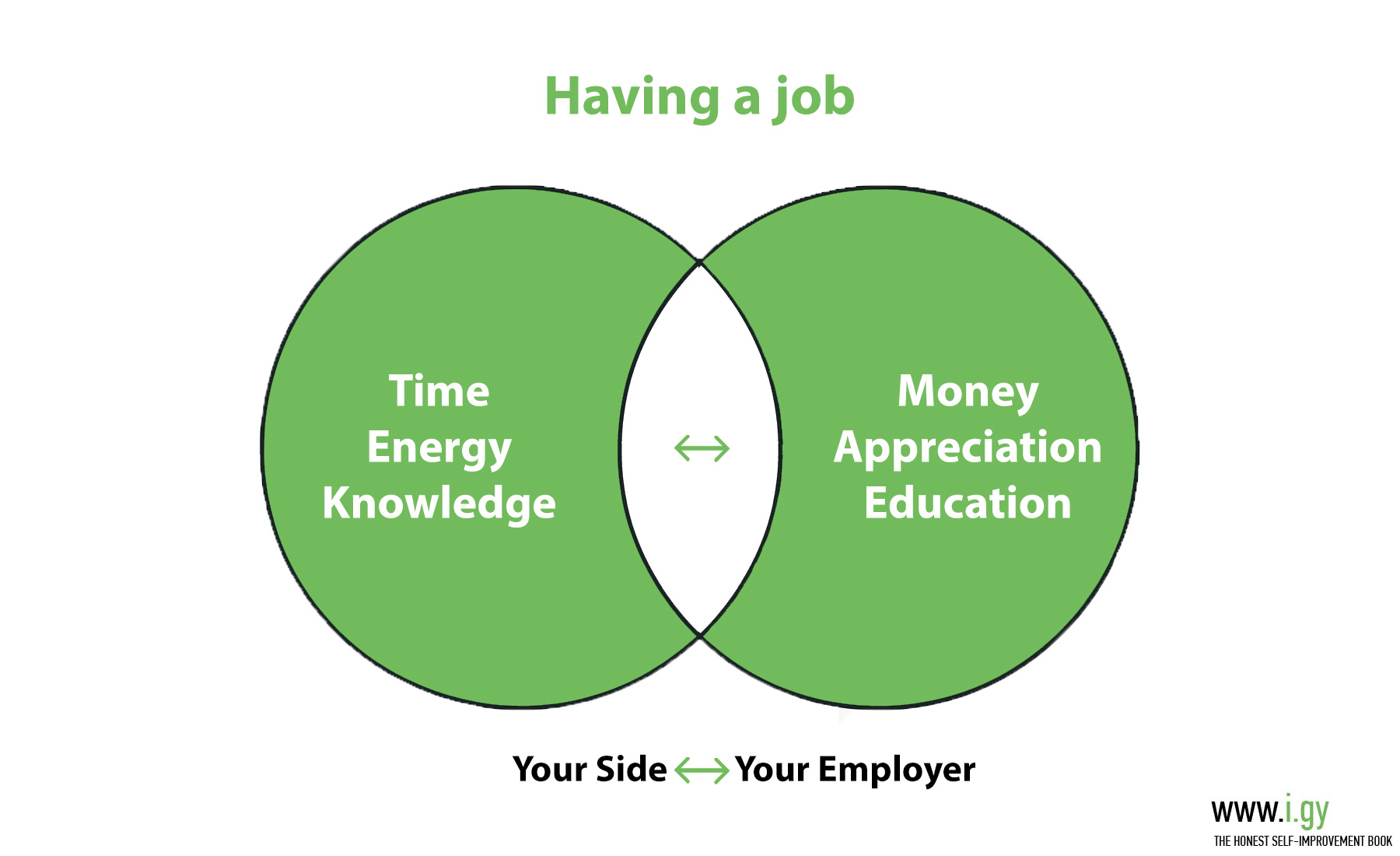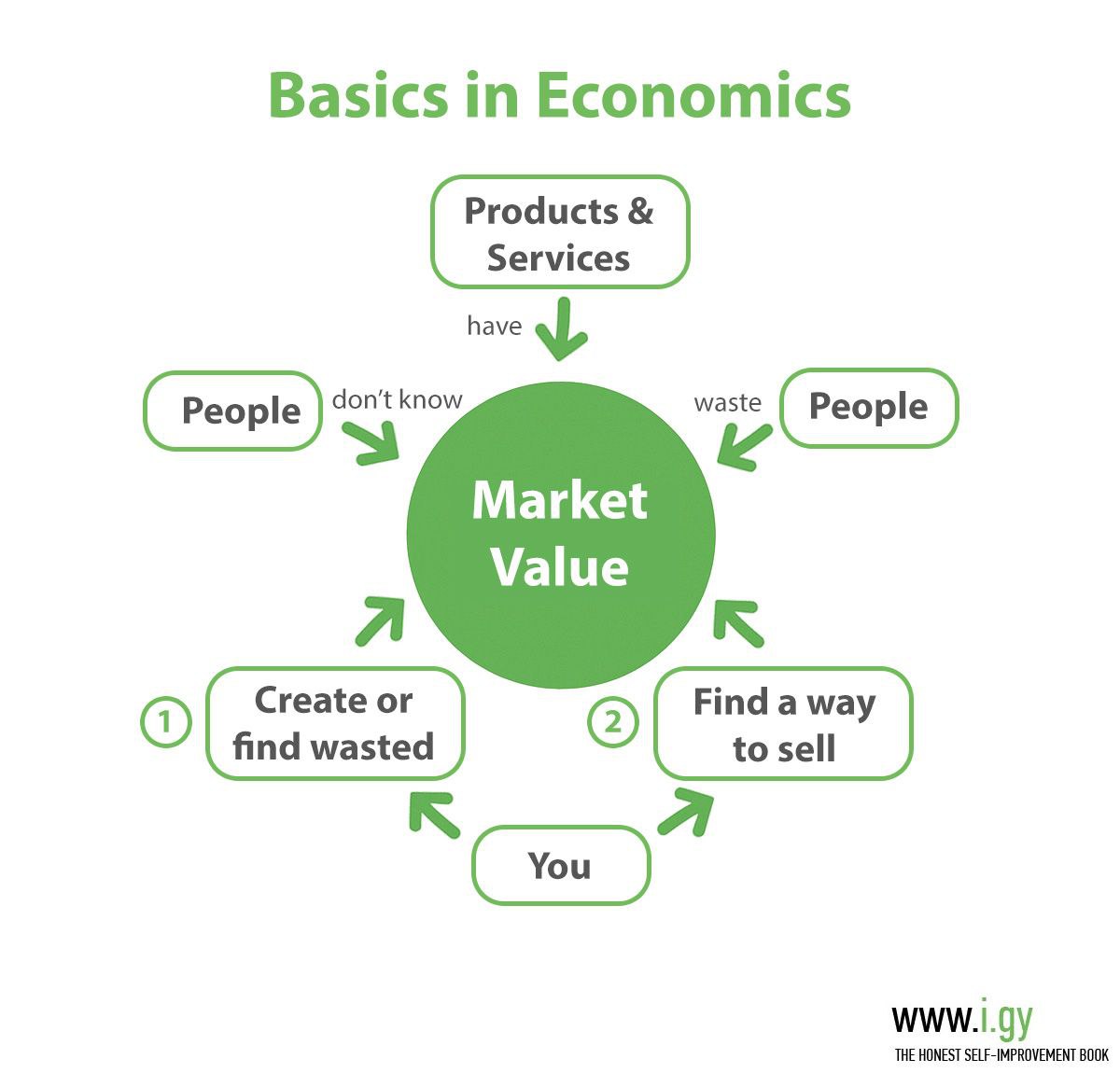The Barriers between different areas in our own life are useless.
Nowhere is this more visible than with the common division of life in “work” and “other” parts. Why divide one whole into two parts and then balance them when you can keep it whole in the first place!?
It’s important to remember these barriers exist only in our own heads (Game of Self) and this is against the natural order of things. We do it because we’re weak, mentally unprepared for some healthy dynamics, and because we don’t understand the fundamental power of Chaos in life.
We’ll only focus on having a Job and an employer who pays us a wage. Some or most of the points below will not hold for entrepreneurs, contractors, freelancers, creators, and people working in fairly managed cooperatives.
Having a job is a complex exchange of:
Time, Energy, knowledge from your side
and
Money, appreciation, Education from your employer
Time
For most people, it’s tempting to have a time limit for work, say 9 to 5. The time limit was a sensible measure for people who historically got mass exploited with long working hours. Knowledge, creativity, and Motivation are now much more important.
The Truth is everyone should work as much, as little, as early, as late, and as remote, as they want, as they deserve with their output and as the nature of the work allows.
Taking full breaks from work makes sense but it’s effective if it’s not only on holidays, weekends and evenings. You should be able to take a break mostly whenever you want. Or work mostly whenever you want.
If you don’t have to work strict hours and you don’t get any work done, you know you don’t love your work.
Energy
Your energy is a function of your motivation. There is no such thing as work motivation or rest-of-your-life motivation. You’re either motivated and in Hunter mode or not motivated and in Sheep mode. If there are strong demotivating factors at work such as lack of appreciation, less than fair pay, or outright bad attitude, simply quit the job. Work should never drain energy and motivation from your life. If everything at work is well and sustainable, the motivation and energy levels should also be similar.
Knowledge (that you give) and education (that you receive)
Well, this one is pretty obvious. Your knowledge and Diversity of Experience are with you anywhere, anytime. The most important and universal skills are self-knowledge and people-knowledge skills. These are not bound to the workplace. You acquire them everywhere in life and use them everywhere.
Appreciation (that you receive)
The concept of fairness and your relationships with colleagues and managers is by definition a subjective matter. As this is mostly a Game of Self problem, it’s always with you. In fact, some studies point out problems at work are the number one reason for unhappiness and others that appreciation is the most important feature of a job.
So this is a big and important thing and you cannot isolate your life from it. It has to be dealt with.
The only emotionally intelligent way is to dissect such a problem into its Game of Life and Game of Self bits
Money (that you receive)
The financial nature of work in a company is as follows: People with diverse skills put them together to create some profit. They use a legal shell called a “company” which takes all positives (potential profits, potential good brand reputation) and negatives (potential liabilities like defaults and lawsuits, potential bad brand reputation) away from the individual people.
If you’re an employee, the free market of goods and services do not apply directly to you. There are three driving forces behind your financial Happiness:
- How well is the company doing (you have a part in this)
- How fairly is the company distributing profits
- The labor market – do other companies compete for your skills
The labor market may give you some negotiating power about the fair distribution but you can never expect to be paid more than:
what you bring the company minus expenses and taxes minus shareholder profits minus some risk buffer for the company in case of bad times.
If you feel you’re underpaid this might be because:
- The company may not earn much
- The company might reinvest all profits
- The shareholders may keep the profits for themselves
- The labor market might offer an easy replacement for you
Short term you are reducing risk. But in 10 years you’ll hardly be at the same job anymore. And the question arises, in those 10 years did you do your best in terms of Diversity of Experience in order to be at the best place now, be it a great Job or an Entrepreneurship? For young people, the biggest long-term risk in life is to just do the same thing.
Not taking any risks in modern life is a risk itself. Life is dynamic and the economy rewards those taking risks.
Seeing money only through the lens of your Day job is a very bad long-term habit. Even if you really like the security of your job, explore the world of money both at and outside of work. Economics is not taught in School in most countries which is terrible for society but great for you, as if you understand economics, you have a vast advantage in life.
You need to know the three basics:
- We live in a free market, every product or service has market value
- People often don’t know the market value nor have the Resources to bring their stuff to market
- Salvaging value, wasted by others, is the same as creating your own, learn to spot the wasted value around you!
And to follow 2 steps trying new stuff with minimal investment and effort again and again until something really works:
- Create (or find wasted well below market value) a product/service that clearly has more demand than supply
- Find a way to sell it
Most Businesses fail because instead of step 1 they do the worst possible thing – copy other common businesses, digging a mathematical supply/demand hole for both them and the copied ones by oversaturating the market.
Any business idea that doesn’t have a clear and looking to last demand over supply advantage can be tossed aside safely.
If you love your work, the balance thing is a fallacy. If you don’t love it, forget all this and start searching for this love right away.
































